#Traces of History
Photo

AREAL VIEW OF THE PORT ARTISANAL
source: Traces of History and Archeology and Art
Nouadhibou Harbor in Mauritania
The Port Artisanal of Nouadhibou is an independent harbour full of pirogues ready to fish in one of the richest fisheries of Mauritania. It becomes a parking lot for thousands of motorized pirogues used for octopus fishing. The boats are waiting for the octopus reproduction cycle to end, so that the fishery can reopen. Overfishing has been decreasing the catch, and in 2018, the year this photo was taken, the catch was 17% over the maximum sustainable yield.
(Nouadhibou is the second largest city in Mauritania, in which fishing
is a very important export branch. About 1.2 million tonnes of tuna, crabs and other fish are caught annually in Mauritanian waters. Only 5% remains for the Mauritanians. Everything else is exported.)
297 notes
·
View notes
Text

Look at this 🥰
Regina King , Tracee Ellis Ross, and Issa Rae
Need a movie NOW !❤️😭
#black people#black women#blackout#black is beautiful#black girl#black pride#black history month#black queen#black woman shit#black men#issa rae#tracee ellis ross#regina king#black hollywood#black actress#black woman appreciation#film making
2K notes
·
View notes
Text
*modern trench warfare being used for the first time in a major conflict during the American civil war*
*trench warfare leaving mental scars on Alfred that takes years of healing to move past*
Alfred showing up to Europe and seeing they somehow made trench warfare worse

#He saw that shit and decided real quick he'd rather be shot out of the sky#trench warfare actually can be found throughout history but was reading a book the other week that talked about how#the roots of how it was used in WW1 and then WW2 could be traced back to how it was used during the US's civil war#hws america#historical hetalia#hetalia#hws#aph#alfred f jones#aph america#hws england#hws canada#hws france#hws germany#hws italy#hws russia#hws china#hetalia ww2#hetalia ww1
350 notes
·
View notes
Text

#Okay but think about this lads#I have a headcanon that lasat stripe patterns are hereditary#Meaning that a Lasat can trace their lineage through their stripes and how they drift over time#A strong stripe pattern is how you carry your family and your history with you#So the only thing zeb has left of his family are his memories and his stripes#Anyways#LADS LOOK I DREW ZEB!!#star wars rebels#swr#sw rebels#garazeb orrelios#zeb orrelios#star wars scribbles#Spotify
276 notes
·
View notes
Photo

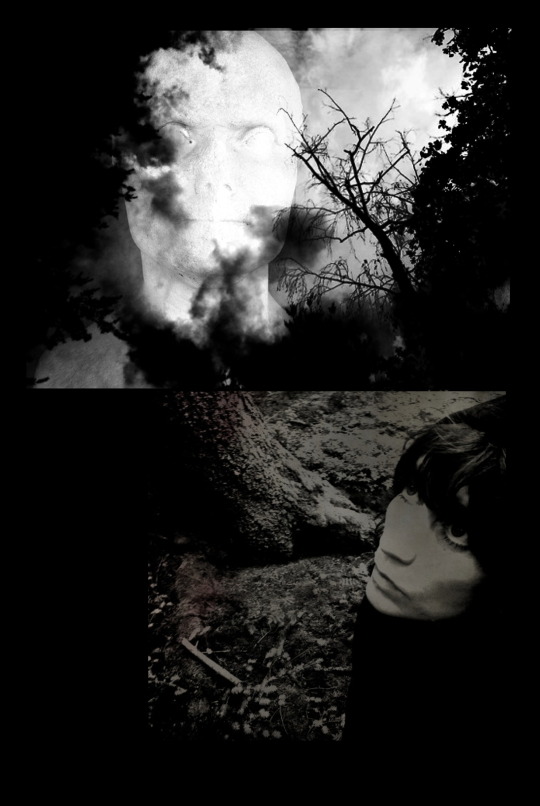



A brief history of Time - series IV
(June photographs of 2019-2022)
222 notes
·
View notes
Text
“Draw your comfort characters like this” ok fine here’s the worst road trip ever
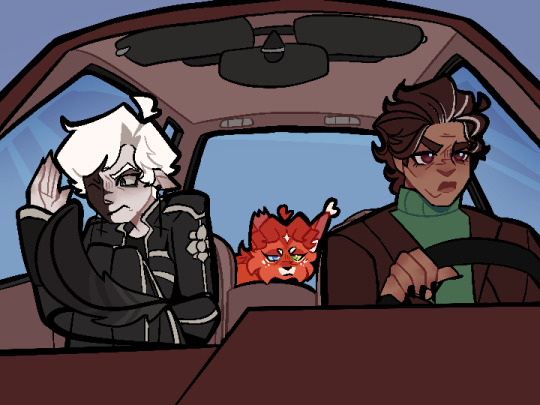

#I TRACED THE CAR BECAUSE I AINT DRAWING ALLAT#miguel o'hara#atsv#across the spiderverse#gerard way#warrior cats#my chemical romance#digital art#mcr#procreate#spiderman 2099#the first time all of my suggested tags can be put here#this is history#squirrelstar#squirrelflight#the black parade#black parade#mcrblr#black parade era#draw your comfort characters#I like deaths expression#and squirrelstars#Miguel’s hair looks half decent too somehow#✮ Spider scribbles ✮
53 notes
·
View notes
Text


The humpback figure with a handprint above its head is likely the Humpback God Ghaan'ask'idii, known for his trademark hump that radiates eagle feathers. The hump is thought to contain seeds and mist. He is portrayed as a deified mountain sheep (note the horns)."
#roadtrip#native american#history#heritage#tradition#culture#daytrip#virtualtravel#New Mexico#NewMexico#historygeek#offthebeatenpath#leave no trace#jolt your journey#earthshotz#rock art#petroglyphs#archaeology#anthropology#navajo
55 notes
·
View notes
Text
I found out many Polish people believe Poland was forced to make Commonwealth with Lithuania, and that Lithuania is to blame because "They would've saved us so much trouble if they won over moscow", and that Catholicism brought prosperity to backward Lithuania, and that Commonwealth was mutually beneficial for most of its time and not only in the beginning, and that Lithuania "used to do business with russia!!" while being OCCUPIED BY RUSSIA... oh my god. I can't imagine Lithuanians saying, "Poland would've saved us so much trouble if they won over nazi Germany🙄". I literally can't imagine even the most radical Lithuanians saying that. This is so unreasonably cruel. What the fuck.
#топ людей з якими я уникаю спілкуватися: українські судді литовські прикордонникі та польскі історики#dear Poland one day I'll come to you and inspect your school history textbooks because this is not okay#Lithuania#as a Ukrainian I'm becoming an expert in finding traces of inciting ethnic hatred
38 notes
·
View notes
Text
Today I, utterly perchance, learned that a friend and I share a bit of history.
Back in the 1630s, members of our respective families took opposing sides in the 30 Years' War and due to some wartime coincidences, my relative, let's call him "Great-Uncle B", a clergyman of some local power and import, felt threatened by the approaching army in which "Friend's Great-Uncle G" was a prominent-ish military commander, and fled to a place of safety.
The funny thing is, I don't believe my friend is aware of any of this, nor are our families geographically from the same region, so this very likely is the only time they (almost) crossed paths before said friend and I were introduced to each other almost 390 years later at a party.
#it's also strange knowing that we both can trace our families far enough back in time to make that connction#why did i only find out about that now#r rambles#coincidence#this certainly boggles the mind#history#17th century
31 notes
·
View notes
Text
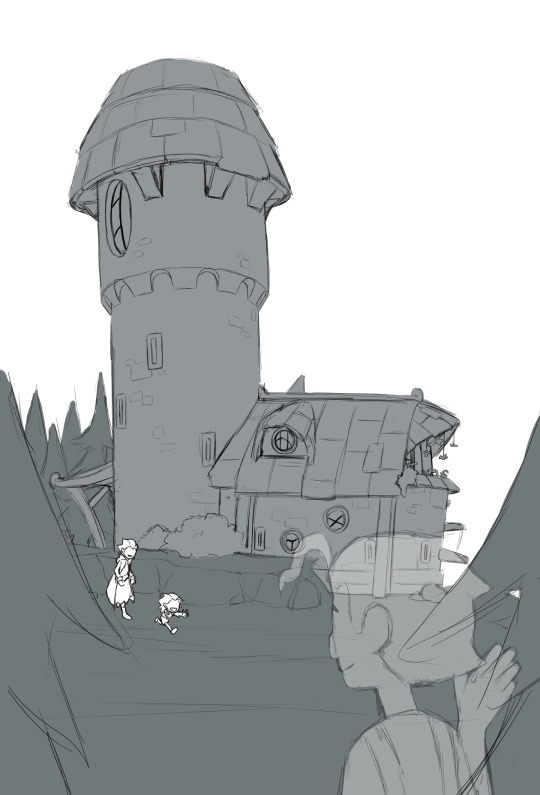
"...you're fixing up my old tower..."
Aaaanyways, since I am finally done with finals and my contest entry for Webtoon, I decided to finally deal with my Owl House brainrot.
This drawing idea stems from the entire theory that Caleb married a Clawthorne and they had a kid he never got to see. And when I heard that line from Dell in "Elsewhere and Elsewhen" about Eda fixing up her dad's old tower (which later became part of the Owl House) a thought popped up into my head: "What if the tower had not only belonged to Dell and Eda, but also to their ancestors?" Hence a hypothetical design of the house during the Deadwardian era! :D
Caleb is dead but he gets to be there, too. He's a ghost.
#and yes i traced the tower and part of the landscape#i was too lazy to draw everything from scratch lol#that tower canonically has more history than you think#like that eye-window in the owl house originally belonged in the tower#and it looks a lot like the eye on the portal#owl house#caleb wittebane#clawthorne ancestor#wittebro#tower#dell clawthorne#elsewhere and elsewhen stuff#deadwardian era#sketch#fanart#theory#my art
676 notes
·
View notes
Text
"A tyrant after the manner of her father."
As one of the children of Offa of Mercia and his celebrated queen Cynethryth, Eadburh inherited an elevated view of queenship. By the time of Eadburh’s marriage, the office of queen was developing into something more akin to the position recognised in the 973 Regularis Concordia, which recognised queens with their own anointing ceremony and made them, like the king, protectors of monastic houses. The queenship Eadburh had modelled to her in the person of her mother was influential, involved in the everyday running of the court, and possessed considerable independent power.
Eadburh’s marriage to Beorhtric does not usually crop up in discussions of conventional peaceweaving marriages because she is most usually considered in terms of political biases reacting poorly against women: her story is recorded in a history written by the victors, in which she is both nemesis and victim. Nevertheless, when considered closely, her marriage does appear to fit the characteristics of a peaceweaving marriage. Her union with Beorhtric seems to have been intended to draw the two peoples more closely together, especially considering the adverse history between the two kingdoms.
The peaceweaving aspect of the marriage becomes more apparent when the considering the relationship between Offa and his son-in-law. Beorhtric’s succession to the West Saxon throne seems to have ushered in a spirit of cooperation between the two traditionally rival kingdoms. In 789, Offa banished Ecgberht, later king of Wessex, and the grandfather of King Alfred. Although he clearly also benefited from the removal of a rival for the throne, Beorhtric enforced this exile as well. There are no formal documents outlining what the relationship between Beorhtric and Offa constituted, although S.E. Kelly detects ‘some hint of subservience … betrayed in the three surviving charters of Beorhtric, where the royal styles are curiously humble and tentative’. Asser’s text similarly confirms the close political relationship between Offa and Beorhtric – which, according to traditions handed down by Ecgberht’s line, is attributed to Eadburh. Asser writes how Offa made the match: ‘Beorhtric, king of the West Saxons, received in marriage [Offa’s] daughter, called Eadburh. As soon as she had won the king’s friendship, and power throughout almost the entire kingdom, she began to behave like a tyrant after the manner of her father’ [...].
The account given by Alfred to Asser is designed to discredit Eadburh and explain why the office of queen had been abandoned in Wessex, and does so by undermining the wife of a dynastic rival. There is considerable bias in seeking to discredit both Beorhtric and Eadburh, but the account fails to conceal that Eadburh probably was, at least at first, a rather effective queen. Before her marriage, she had witnessed charters as the daughter of the king and queen of Mercia. To be able to muster power of the sort attributed to her suggests that she had good relationships: she won the friendship of the king, her most important relationship. For Eadburh to have power throughout the kingdom, she must have maintained a good relationship with her father and brother to protect her, but possibly also forged new relationships by a mixture of patronage and promoting their interests at court. These are skills she may have learned from her mother Cynethryth [.] [However, Cynethryth] had the distinct advantage of having a Mercian background herself, and as a result did not have to negotiate the difficult position of mediating between her natal family and identity and her status as queen of a different kingdom in quite the same way.
The West Saxon traditions handed on by Ecgberht’s descendants clearly blame Offa and his tyrannical ways for influencing his daughter’s practice of queenship [and indicates that she might have acted as ‘an active representative of Mercian interests at the West Saxon court', as Barbara York points out]. On closer consideration, Eadburh is far more likely to have emulated her mother’s practice. Unusually, Asser and Alfred ascribe Eadburh’s monstrous behaviour as deriving from her father’s model of kingship. Other texts tend to emphasise feminine monstrous and overly assertive behaviour, especially where Offa’s queen Cynethryth is concerned.
Misogynistic leanings influenced the way that both Cynethryth and her daughter Eadburh are portrayed. Traditions at St Albans blamed Cynethryth for the murder of Æthelberht, drawing on a biblical tradition associated with John the Baptist. It is hardly surprising, therefore, when Eadburh herself was blamed for the deaths of unnamed nobles as well as Beorhtric and a well-loved West Saxon noble, probably Worr, as recorded in the Anglo-Saxon Chronicle entry for 800 [...].
The accounts of Eadburh following the death of Beorhtric come solely from the West Saxon dynasty hostile to her husband and father, but other independent sources may corroborate certain details. The account of her behaviour at Charlemagne’s court in Asser’s text may contain some kernels of truth, but seems to be a wild attempt to further discredit Eadburh and her Mercian heritage. After her husband’s death, Eadburh fled with a quantity of treasure, which may have either been her own treasure, or the royal treasury. The West Saxon tradition states that Eadburh later sought refuge in Francia, where she came to Charlemagne’s court and was offered a choice of husbands – either Charlemagne, or one of his sons. In the story, Eadburh selfishly chose the younger option, and as punishment for her selfish choice, was given neither, but instead received a nunnery (V. Alfredi, c. 15). There is a kernel of truth at the core of this tradition: Offa and Charlemagne had been in negotiations for one of the Mercian princesses to wed to one of the Frankish king’s sons. The talks broke down, reportedly, because Offa insisted on a reciprocal Frankish princess bride for his son Ecgfrith. The attribution of Beorhtric’s death to Eadburh is difficult to either confirm or deny: Ealhflæd’s involvement in Peada’s death demonstrates that a queen could be involved in her husband’s death, and poison was a favoured accusation to use against unpopular queens from antiquity into the modern age*. The account contains yet one more kernel of truth: Eadburh’s geographic peregrinations. Asser’s account in Chapter 15 of his Life of Alfred records that Eadburh spent some time as an abbess in a Frankish abbey before being ejected for having an affair with one of her countrymen, and ended her life begging in Pavia. Janet Nelson’s analysis of this information points out that there are some reasons to believe Asser’s version: Frankish abbesses tended to be royal appointments, and an entry in the Reicheneau Liber Vitae has an ‘Eadburg’ who was abbess of a convent in Lombardy. Pavia was on the traditional pilgrimage route to Rome, which was popular with early English pilgrims. Eadburh’s continental peregrinations also fit with the developments in Mercia following her marriage. In 796, Offa died, leaving the throne to his son and heir Ecgfrith. Unfortunately, Ecgfrith passed away within months, ending the dynasty. With the passage of the throne to a relatively distant relative in Coenwulf, there was little to offer Eadburh on her return. Like Osthryth, the collapse of her family caused by the deaths of her nearest male relatives weakened her options to a delicate situation, thereby obliging her to seek assistance abroad.
Eadburh is vilified in the West Saxon sources as a wicked queen whose appetite for fame and power were her undoing. Because Offa helped drive Ecgberht from Wessex and into exile, the royal line descended from Ecgberht largely effaced the office of queen, recently expanded and abused by Offa’s daughter, from the way they ruled. Asser comments how the West Saxon kings following Ecgberht did not follow the custom of nominating the king’s wife as a queen as a response to Eadburh’s wickedness.He remarks on ‘the (wrongful) custom of that people … [f]or the West Saxons did not allow the queen to sit beside the king, nor indeed did they allow her to be called “queen”, but rather “king’s wife”.
Stefany Wragg, "Early English Queens, 650-850: Speculum Reginae"
*The Anglo-Saxon Chronicle, when writing about Beorhtric's death in 802, makes no mention of any alleged treachery and/or poison on Eadburh's part. This is in sharp contrast to the way chronicles did almost unanimously emphasize the role of another queen - Ealhflæd - in the murder of her husband. It's possible, though unlikely, that Beorhtric may have simply died naturally. Alternatively, considering the death of his Mercian protector Offa just a few years before his death, considering that he was succeeded immediately by Ecgberht, an enemy he had exiled from the kingdom, and considering how there was apparently a battle between a Mercian and Wiltshire ealdorman on the same day Ecgberht ascended the throne (resulting in Mercian defeat), it's quite possible that the cause for Beorhtric's downfall was dynastic, and more akin to a traditional defeat or deposition, than any conveniently miscalculated treachery by his wife. In this context, Eadburh's sudden flight abroad with a quantity of treasure after his death resembles that of other queens who witnessed the downfall of their dynasties and had to flee to protect themselves.
#historicwomendaily#she and Seaxburh are the most interesting Anglo-Saxon queens to me for sure (though Ethelburh Aethelflaed and Edith of Wessex come close)#I want to do a separate post 'tracing' Eadburh and what we know of her + my own interpretation someday#but until then....here's this post#anglo-saxons#anglo-saxon england#eadburh#eadburh of wessex#english history#my post#queue
15 notes
·
View notes
Text
54th NAACP Image Awards Red Carpet Post 5










#marsai martin#zendaya#yara shahidi#young black Hollywood#naacp image awards#black history month#issa rae#tracee ellis ross#tenoch huerta#johnathan majors#marvel
109 notes
·
View notes
Text
i let the mental illness win
god this specific jack ryder is so special and precious to me
if i'm feeling it i may make another one of these for season 2
#jack ryder#btaa#batman the audio adventures#this series is what got me into the creeper fun fact#i trace my obsession back to a specific clip from season 2 that made me go “huh i should read the comics” and the rest is. history.#btw my favorite clips in this are “WHY HAVENT YOU PEOPLE CAUGHT HIM ISNT THAT WHY I PAY MY TAXES” and “who am i? who are YOU? a TOURIST?”
12 notes
·
View notes
Text
'try to do historical research without having a meltdown over the erasure of women from public documents' challenge (level: impossible)
#what do you mean every woman in Jamestown becomes impossible to trace the second they get married. what if i kill myself#history#to make it even worse the female author of this article is only credited as the wife of her husband. brb gonna go huff glue
19 notes
·
View notes
Text
The main role of clockworks had obviously been for them to fight in the wars for Valencia, but their secondary purpose was to entertain Valencians and act as their servants. They were seen as objects and treated as nothing more.
So when Gazpaccio built Kane and regarded him as family, as his own son, it was seen as strange and impractical. He was using Kane to assist him with toy-making and gain vengeance on others - there really was no need to see and treat him as something more, but Gazpaccio still welcomed and cared for him as his own flesh-and-blood regardless.
One of the influences he (unintentionally) left on Kane was this concept of relationships - as Kane viewed his own creations as his family, just like his father did with him.
#headcanons#gazpaccio#i dont share many hcs anymore so ill post these every now and then#thinking of the few instances where gazpaccio clearly had an influence on kane beyond the corruption of his vengeance#i imagine gazpaccio received lot of judgement and skepticism from others when he openly treated and regarded kane as his 'son'#kane saw this dynamic and repeated it with his own creations. he COULD'VE created the elite and regarded them as only his councils#but he doesn't. they have what surely has to be a unique situation with clockworks compared to their history in valencia#and i just think it's possible he'd gotten that from gazpaccio. how he was the first to truly treat a clockwork as something more#also i don't regard queen as kane's daughter. if i haven't made that obvious. i see her as his partner he created to share his ideals#in the image of the king and queen chess pieces#what is a king without his queen? the most powerful piece on the chessboard?#it's interesting how kane regards his relationships with clockworks. the elite all do. it's a more humane trait to them#that can only be traced back to gazpaccio#at least that's how i see it
11 notes
·
View notes
Text
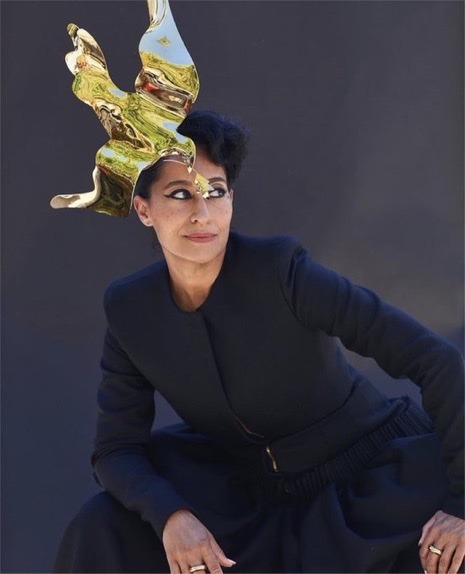




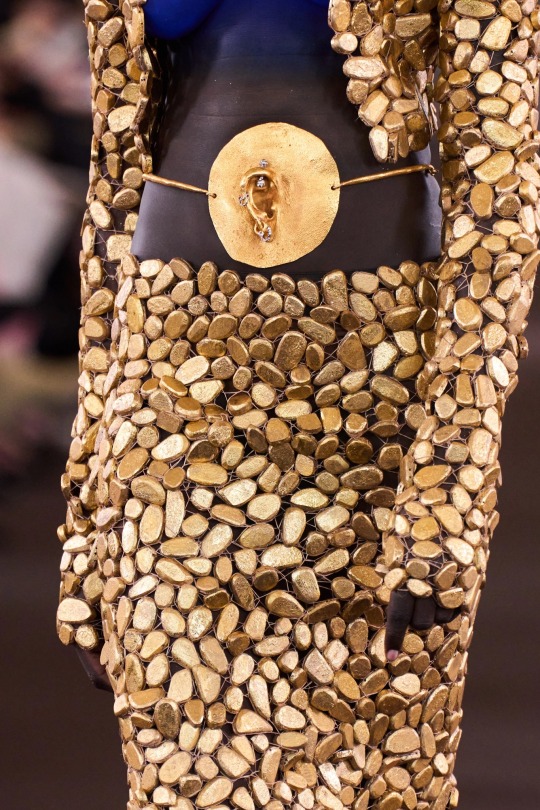



Happy Birthday to Daniel Roseberry, Creative Director of Schiaparelli
#Schiaparelli#Daniel Roseberry#couture#haute couture#fashion#high fashion#fashion history#tracee ellis ross#Cardi b#maty diba#hunter schafer#Bella hadid#precious lee#bruna marquezine#lady Gaga
24 notes
·
View notes